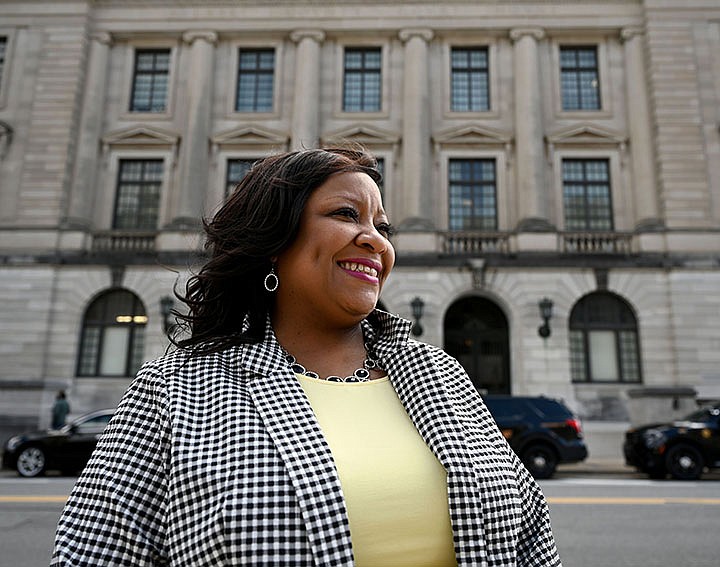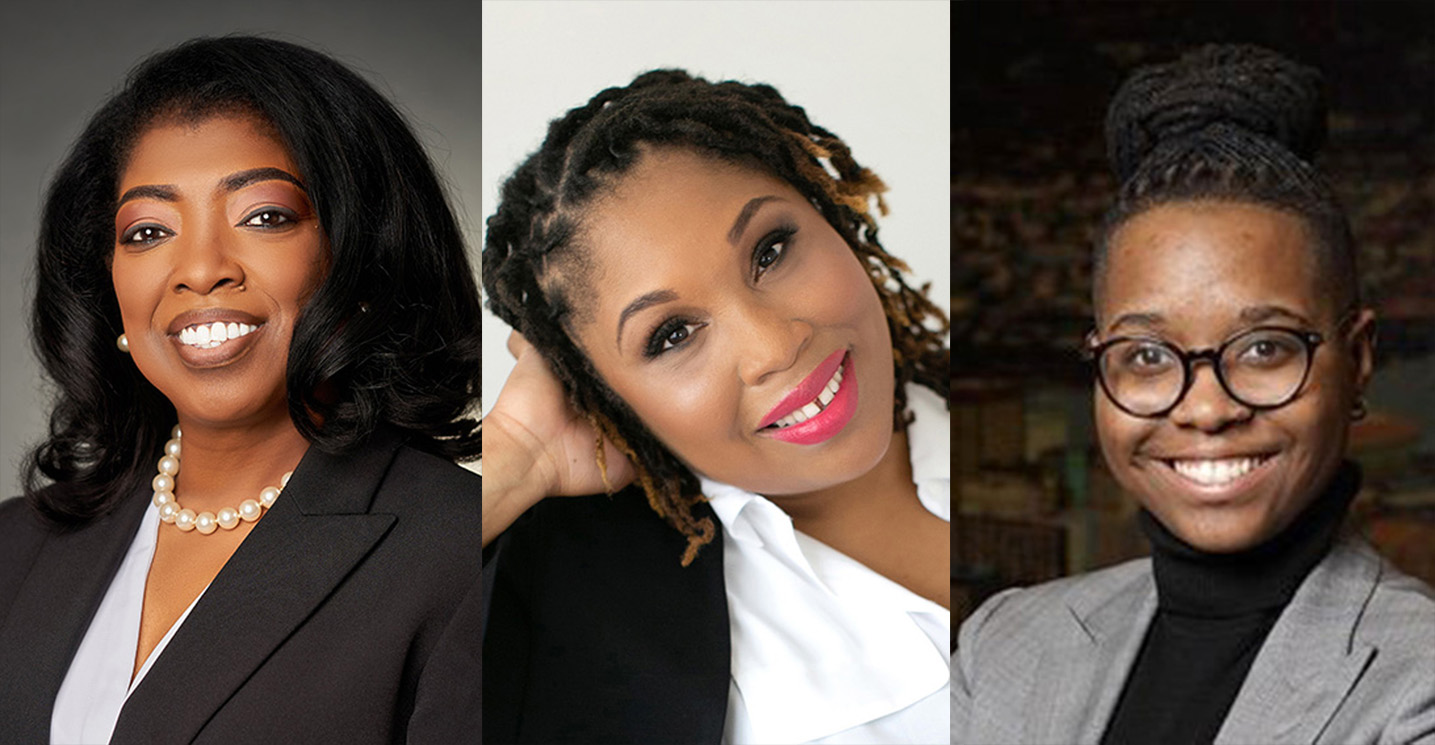Members of Arkansas' Black legal community cheered the confirmation of Ketanji Brown Jackson to the Supreme Court on Thursday, a move that cemented her spot in history as the first Black woman to be elevated to the nation's highest court.
While attorneys expressed joy with Jackson's confirmation and described her nomination as a source of pride and hope, several Black women attorneys said the Senate vote also capped a nomination process in which Jackson faced unfair insinuations about her judicial record.
"Today is a great day," said Alicia Walton, a public defense attorney who is running to become the 6th Judicial District prosecuting attorney, which includes Pulaski and Perry counties.
"We've had our first Black president and now we have our first Black female on the U.S. Supreme Court. It shows we are making progress but her confirmation hearings show there is a lot of work that needs to be done."
Jackson, a federal appeals judge and a former federal public defender, was nominated by President Joe Biden to fill the Supreme Court seat held by Justice Stephen Breyer, who announced earlier this year that he would retire at the end of the court's current term.
In the process, the 51-year-old jurist navigated forceful questioning from Senate Republicans, who broadly opposed her confirmation.
To LaTonya Austin Honorable, a general practice trial attorney based in Pulaski County, Jackson was not afforded the proper level of respect during her nomination process, something that reflected the kinds of issues many Black female attorneys deal with in the legal industry.
"Even the challenges that she has faced in terms of the hearings, those are things that we go through every day in terms of how people look at us and how they respect us," said Honorable, who is running for circuit judge.
In some areas, Black women attorneys are still subject to demeaning attitudes from colleagues and judges, she said.
"There is still that tone and tenor of: You don't belong here," she said.
Honorable, who is Black, recalled one time during her time as a prosecutor when both she and a white male defense attorney told a judge they would need one day for a jury trial.
But when the trial needed more time, the judge considered holding Honorable in contempt of court but not the white male defense attorney, she said.
The nomination of Jackson gives a sense of hope that such attitudes will change, she said.
"My colleagues that I've talked to, it gives them hope that one day we may actually be seen as equals," Honorable said. "Maybe one day I will be seen as an equal with a white male attorney or even a Black male attorney. Because right now we're not."
Black women often have their knowledge questioned in the legal profession, said Walton.
There also can be inequities in how Black women are perceived, she said.
"I can't be too forceful because then I am an angry, Black woman," she said. "At all times I'm checking myself. It is not me being fake. I've found a way to be me and not allow others to define who I am."
Watching the confirmation hearings was emotional, Walton said, adding that certain lawmakers took Jackson's comments out of context and used them against her.
Jackson's confirmation cleared the Senate in a 53-47 vote with three Republican senators supporting Jackson: Sen. Susan Collins from Maine, Sen. Mitt Romney from Utah and Sen. Lisa Murkowski from Alaska. Arkansas' two Republican senators, John Boozman and Tom Cotton, voted against her nomination.
Shana Woodard Graves, an attorney in Little Rock, said she was "overjoyed" on Thursday to witness the confirmation.
"It's astounding that we are still experiencing these 'firsts' in 2022," Woodard Graves said. "Diversity of thought and life experiences matter, especially in a role as critical as that of a Supreme Court justice. I think this is a gigantic milestone for our country as a whole and the legal and justice system specifically."
It was validating and frustrating to watch the nomination hearings, she said.
"A lot of people who don't have a law degree don't know what it is like to be a Black female lawyer and we saw that in the questioning," Woodard Graves said. "Nobody checks as many boxes as she does and there were a lot of questions about if she was actually qualified."
Republicans criticized Jackson's criminal-sentencing record and aimed to paint her as soft on crime.
Among those lawmakers was Cotton, a hard-right conservative who sits on the Senate Judiciary Committee and questioned the judge.
Earlier this week, the junior senator from Arkansas delivered a Senate floor speech lambasting the judge's record, calling her a "dangerous" judge who "built her career as a far-left activist."
"She personifies activism from the bench," he said. "She has crusaded to undermine criminal sentences, and she cannot be trusted to interpret the law or the Constitution as written."
Cotton said she's acted "as a de facto lawyer for criminals from behind the bench as she did from in front of it."
"Judge Jackson's record makes clear that her brief stint as a criminal defense attorney wasn't motivated merely by a devotion to equal representation of all, it was part of a deep commitment to leniency for criminals," he said.
During the nomination hearings, Cotton questioned Jackson over a case in which she sentenced the defendant to 20 years in prison. Cotton said she later reduced the man's sentence, accusing her of rewriting the law to "cut the sentence of a drug kingpin."
Jackson pushed back on that assertion, saying Congress had provided judges with the opportunity to review sentences through a compassionate release mechanism.
The next day, Cotton devoted part of his questioning to Jackson's representation of detainees from the Guantanamo Bay detention center.
When asked how many Guantanamo Bay detainees she represented, Jackson said four cases were assigned to her when she was a federal public defender.
Public defenders do not pick their clients, said Brenda Stallings, who works as a deputy public defender for Pulaski and Perry counties. Instead, public defenders protect a defendant's constitutional rights, but that does not mean those lawyers subscribe to a defendant's beliefs or approve of their actions, she said.
"That does not mean we are sympathetic to them, or we are sympathetic to the seriousness of the situation," said Stallings, who is running for a judicial position.
During the nomination hearings, some Republican senators drew disapproval from critics who argued the lawmakers raised questions that had little to do with Jackson's abilities to serve on the Supreme Court.
Furonda Brasfield, who runs a private law firm in Stuttgart, said watching the hearings was painful and triggering. She referenced Cotton's line of questioning as well.
"You can ask legitimate questions but just to be mean-spirited for the sake of it, that is a disappointment. That is sad," she said. "As a Black woman, it makes me question who is representing me. A person who would do this is not my representative."
Marquisa Wince, founding executive director of the Arkansas Appleseed Legal Justice Center, said Jackson's ability to remain professional throughout the hearings was an encouragement.
Wince said it was a reminder to "always move with integrity."

